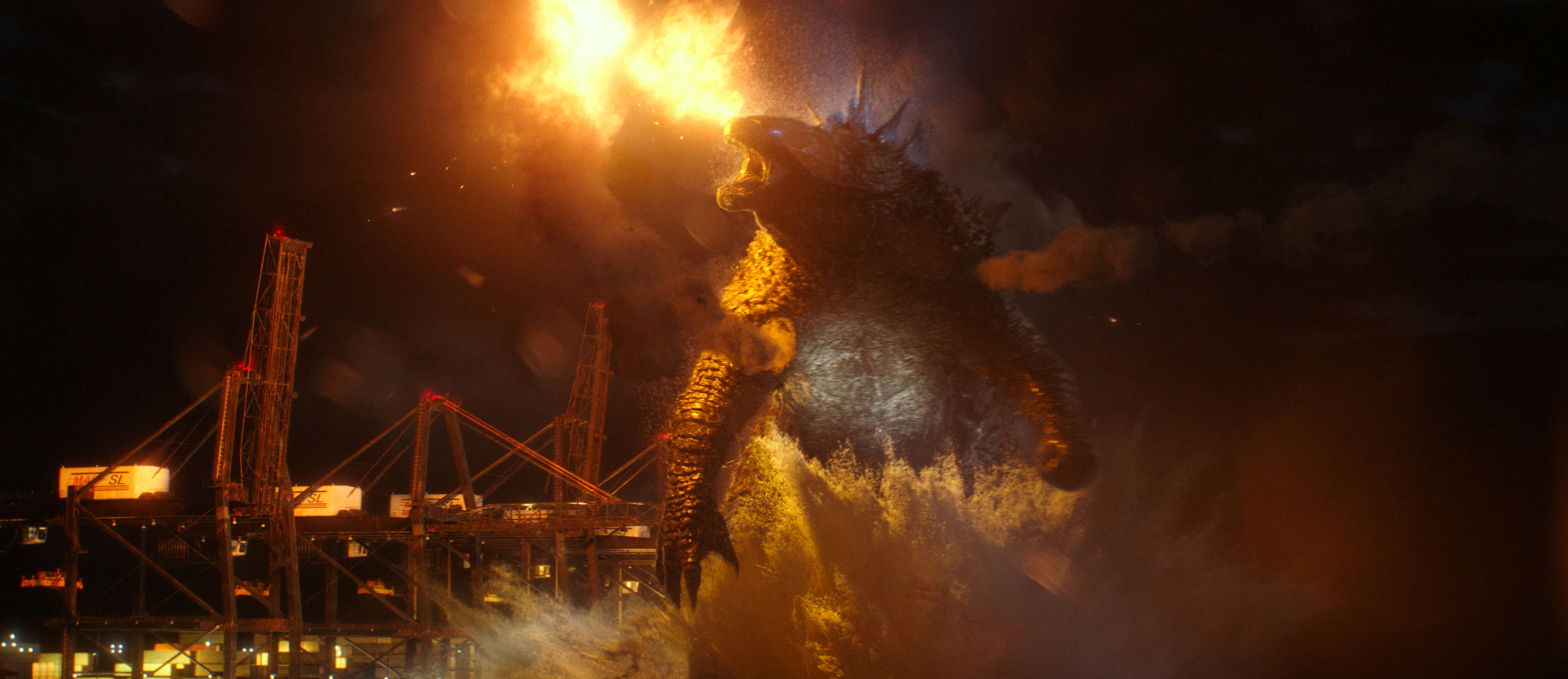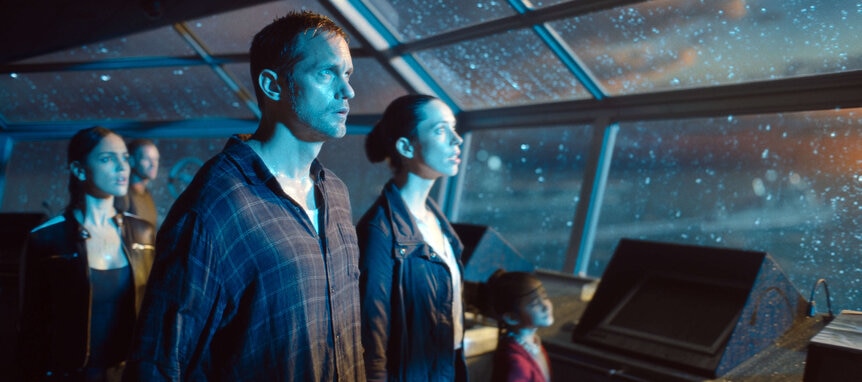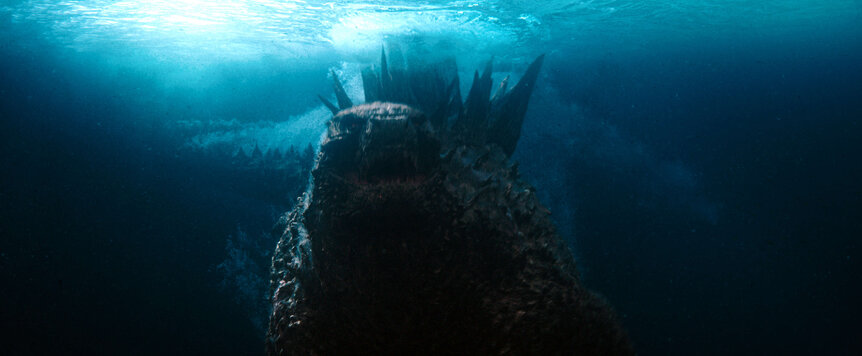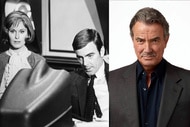Create a free profile to get unlimited access to exclusive videos, sweepstakes, and more!
'The end of a chapter': Godzilla vs. Kong writer on pitting ancient antiheroes against 'human agency'

Have you watched the massive titans bash each other into next week yet in Godzilla vs. Kong? If so, then you're ready for Part II of our exclusive conversation with Monsterverse writer Max Borenstein. As the only screenwriter to have worked on all four of the Legendary films that make up the American reboot of the Toho mythology, he's got plenty of insight on how this showdown between the two icons came to be without really making audiences pick sides.
In this spoiler-filled installment, SYFY WIRE gets Borenstein to open up about any mandates that he was required to include in the battle royale, the introduction of another mythic icon, and his personal highwater moment watching Godzilla vs. Kong.
Godzilla vs. Kong was always the intended outcome for Thomas Tull, the former CEO of Legendary who initially brokered the funding and financial means to create this new Monsterverse. Because this was his baby and you were there from the creative start, was there any mandate of what he wanted to see in this film?
Well, he was gone from the company by the time I started working on this film. My last interaction with him at Legendary was during Kong: Skull Island. But I think the mandate from him and from Legendary, with regards to "Godzilla versus Kong," was how to skin the cat.
So, these are obviously two superhero characters, right? Neither of them are human. They're both really complicated antiheroes, so I always assumed that was the mandate.
You're credited as the co-writer of Godzilla vs. Kong with Eric Pearson (Thor: Ragnarok), so were you on this one from the start, or did you get folded back in later?
I didn't write the first draft of this project. I came in on this one a little bit later in pre-production to help reassemble some things and take a lot of great work that had been done, and do some adjustments and massage things, the way you do.
Coming in on this one was interesting and very different from Godzilla [2014], which was much more like, "OK, I'm going to generate a story here with [director] Gareth [Edwards]." This was much more like: "Here are the pieces." But the pieces felt to me like they must have always been there and been organic because I don't know how else you get there [otherwise]. Neither of these two guys is the bad guy and none of them is going to lose in their own movies. The versus is about them overcoming their immediate setup.
Let's talk about that because even the marketing for the film asks audiences to pick a side. But all three movies prior to this one do a great job setting up Godzilla and Kong as inherently sympathetic characters. Can you discuss the challenges dealing with that in Godzilla vs. Kong?
We had set up in Kong this idea of an ancient rivalry between the Godzillas and the Kongs. That was kind of baked in, this idea that they — as natural creatures — they're at odds like dogs and cats. This is the Alpha Dog and the Alpha Cat, and neither will ever bow to the other.
So my proudest contribution to the whole [franchise] is the "Let them fight" moment in Godzilla. As a writer, so many lines of dialogue [in a final film] are a hodgepodge of everything. The story [may have] stayed but there are very few lines of dialogue that you can say, "Oh, that's one of mine!"
In this one, it's the idea of who will bow to whom. You're talking about two kings — the King of the Monsters and King Kong — and that felt like an iconic idea. They're fighting it out for supremacy. But then put in that there's another villain, so neither is going to bow to the other. And in the end, [Godzilla and Kong] bow down to one another, as it were, and part ways not as friends but with professional respect.
That "other villain" is Mechagodzilla, an icon a lot of fans hoped would eventually show up in one of these films. How did he become the titan these two have to defeat?
It took a lot of tinkering to get it to work. Initially, in my first draft of Godzilla: [King of the Monsters], the piece that was in my version was Mechagodzilla appearing in that film. They punted that, but ultimately it was cool to see it re-emerge when I came back in on Godzilla vs. Kong. It made a lot of sense to be there because then you have these two iconic adversaries, but neither one is a villain. So let's introduce an iconic villain.
And what's great about Mechagodzilla, obviously, is that in a world where these creatures are really not representational of human agency, [people] take Kong to help them get down into the tunnel [to the Hollow Earth]. We were able to craft reasons and ways of keeping the human beings involved but that's challenging with these [movies]. Because at the end of the day, the people are expendable amongst the insanity. You're trying to do your best to write dialogue and have people in there that feel like real humans, but no matter what, we all know that it's the monsters that are running the show.
Part of the beauty of Mechagodzilla is that he's a human-controlled creature — at least for a while — that is like an avatar for human agency in a much more direct way than Godzilla or Kong would ever be. And Kong is on the spectrum of being that much closer to humans insofar as he's a primate. Godzilla, essentially in my mind, is like a force of nature with a little bit of an attitude, but not with the kind of conscience that we have.
Mechagodzilla becomes a really great, obvious candidate for creating human conflict and human interaction with the monsters.
The Hollow Earth sequences are like unabashed Jules Verne playgrounds. Was that the brainchild of someone specifically?
By the time I came in, that was a decision that had been made and I thought it was great. [Director] Adam [Wingard] just killed that whole sequence. What he did that I thought was great is that he made it not about plot. He made it really about this experience about the transformative nature of that [place] and it's just beautiful. I thought it was fantastic. It felt like Avatar.
There's no post-credit scene in Godzilla vs. Kong. Does that imply something specific?
Yeah, I can't speak to that. It's definitely a Legendary question. It certainly feels to me like this is the end of a chapter. Hopefully, if it's successful, and people dig it, then these things tend to have a continuity that people want to continue. It might be, not a restart, but like another chapter. But I don't know.
Four films in the Monsterverse, there have been a lot of incredible visuals and moments. What's your personal favorite for Godzilla vs. Kong?
Above all, it's that gut feeling that you have when these two icons finally clash. Adam killed those sequences. The way you feel in the moment, I respond to them because I respond to the emotion that I feel I played a strong role in bringing out, which is this idea of investment that hopefully the audience will have in Godzilla, as a sympathetic figure that's nonhuman but nonetheless we feel attachment to. And same with Kong, but in a different way.
As a storyteller — particularly working on these films — it's being able to achieve that gut feeling you have that you wouldn't have if it was just two random dinosaurs fighting, right? We've created those characters by putting them in situations and building out a sense of their mystique and a sense of their stature and a sense of their mythos so that when they come to clash, you're rooting for it. Seeing the trailer drop and the fans' reactions, that to me is as much a reward as anything because that's what we've worked so hard to build. This was the goal.
Godzilla vs. Kong premiered internationally on March 24 and is now in U.S. theaters and on HBO Max as of March 31.
















